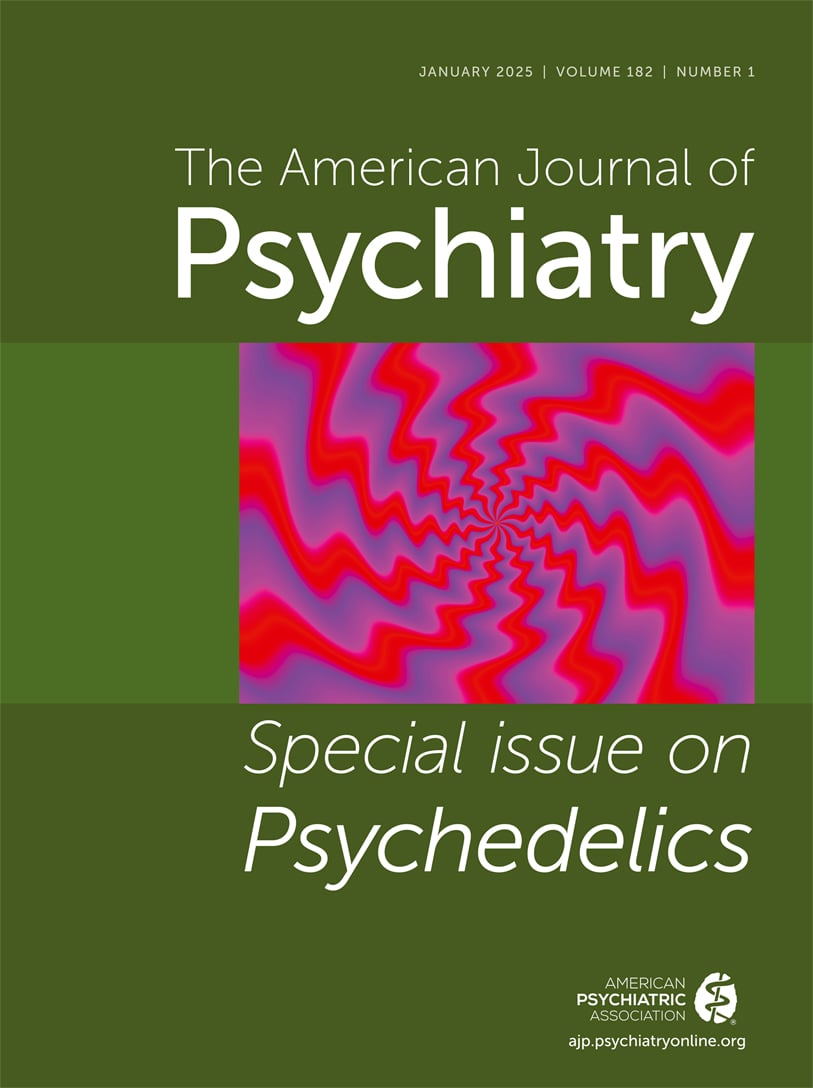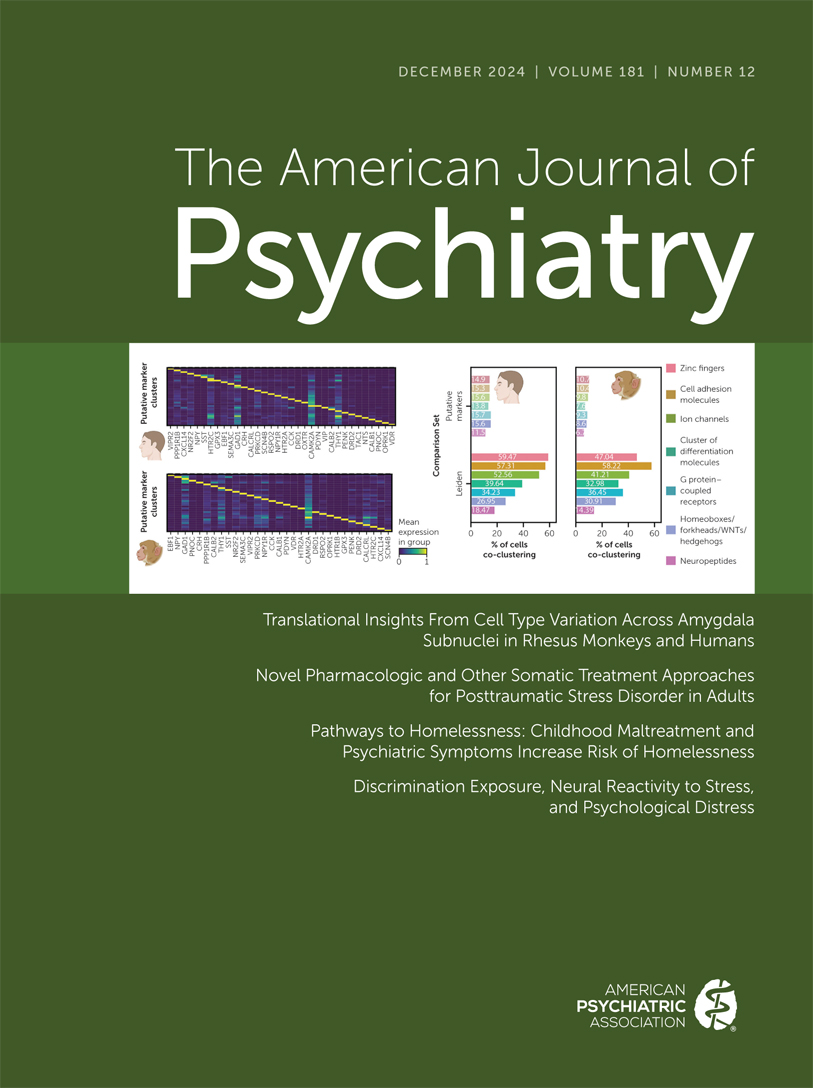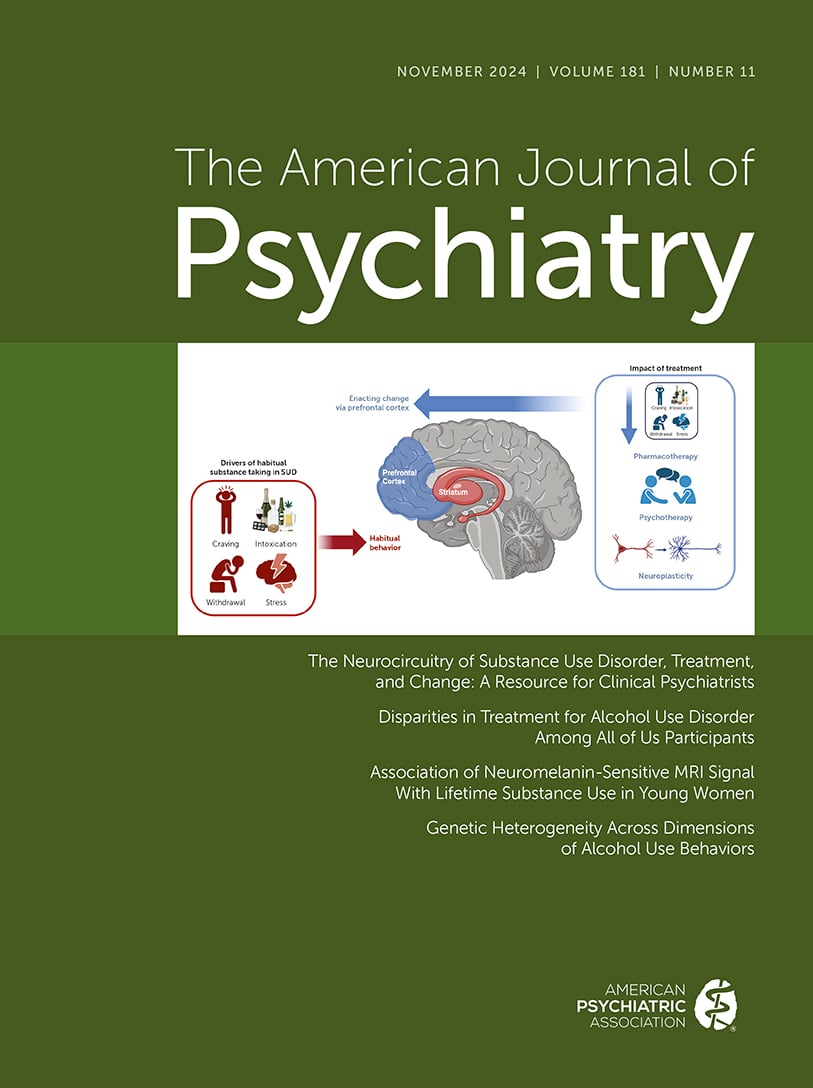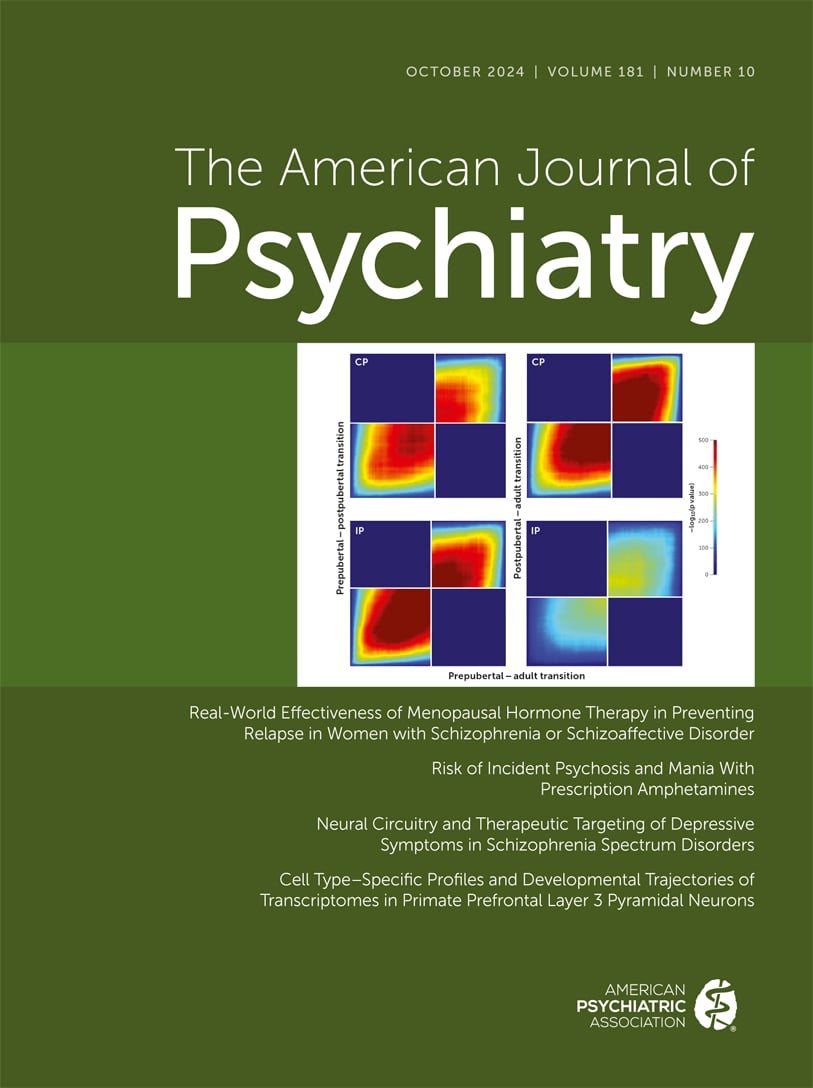American Journal of Psychiatry
- Volume 163
- Number 6
- June 2006
In This Issue
Editorial
Images in Neuroscience
Reviews and Overviews
Publication date: 01 June 2006
Pages962–968Objective: The purpose of this article is to review current research evidence for clinicians involving families in the assessment and treatment of their patients. Method: Research on effects of family support on illness ...
https://doi.org/10.1176/ajp.2006.163.6.962Publication date: 01 June 2006
Pages969–978Objective: This article is an overview of epidemiological and treatment studies suggesting that deficits in dietary-based omega-3 polyunsaturated fatty acids may make an etiological contribution to mood disorders and that supplementation with ...
https://doi.org/10.1176/ajp.2006.163.6.969Introspections
Treatment in Psychiatry
Clinical Case Conference
Images in Psychiatry
Article
Publication date: 01 June 2006
Pages993–1000Objective: Childhood maltreatment is an important psychiatric risk factor. Research has focused primarily on the effects of physical abuse, sexual abuse, or witnessing domestic violence. Parental verbal aggression has received little attention ...
https://doi.org/10.1176/ajp.2006.163.6.993Publication date: 01 June 2006
Pages1001–1008Objective: This study was a 20-year follow-up of offspring of depressed and nondepressed parents to determine the magnitude and continuity of the risk of parental depression to the offspring. Method: The authors followed 151 ...
https://doi.org/10.1176/ajp.2006.163.6.1001Publication date: 01 June 2006
Pages1009–1018Objective: Many depressed women have a history of antisocial behavior, but research into maternal depression has not ascertained if this has implications for children of depressed mothers. This study compared the developmental outcomes in and ...
https://doi.org/10.1176/ajp.2006.163.6.1009Publication date: 01 June 2006
Pages1019–1025Objective: Childhood maltreatment is a potent risk factor for subsequent aggressive and criminal behavior. A recent study suggested that the relationship between maltreatment and antisocial behavior may be moderated by a genetic vulnerability ...
https://doi.org/10.1176/ajp.2006.163.6.1019Publication date: 01 June 2006
Pages1026–1032Objective: Internalizing behaviors in children between 4 and 5 years of age who had been prenatally exposed to psychotropic medications were investigated. The authors had previously reported the effects of prenatal medication exposure in this ...
https://doi.org/10.1176/ajp.2006.163.6.1026Publication date: 01 June 2006
Pages1033–1043Objective: Directed attention, the ability to allocate and direct attention toward a salient stimulus, is impaired in attention deficit hyperactivity disorder (ADHD). This construct is often assessed with target detection or oddball tasks, and ...
https://doi.org/10.1176/ajp.2006.163.6.1033Publication date: 01 June 2006
Pages1044–1051Objective: A relatively small number of functional imaging studies of attention deficit hyperactivity disorder (ADHD) have shown abnormal prefrontal and striatal brain activation during tasks of motor response inhibition. However, the potential ...
https://doi.org/10.1176/ajp.2006.163.6.1044Publication date: 01 June 2006
Pages1052–1060Objective: Difficulty with response inhibition is a cardinal symptom of attention deficit hyperactivity disorder (ADHD), combined type. Prefrontal and cingulate brain regions are known to be involved in inhibitory control. Event-related ...
https://doi.org/10.1176/ajp.2006.163.6.1052Publication date: 01 June 2006
Pages1061–1065Objective: This study explored the extent to which the high frequency of psychiatric problems reported in clinical groups with fetal alcohol spectrum disorders might also be observed in a nonclinical group of young adults and the psychiatric ...
https://doi.org/10.1176/ajp.2006.163.6.1061Publication date: 01 June 2006
Pages1066–1073Objective: Substantial evidence suggests that both environmental and genetic factors contribute to the development and clinical expression of Tourette’s syndrome. Although genetic studies of Tourette’s syndrome are common, studies of ...
https://doi.org/10.1176/ajp.2006.163.6.1066Publication date: 01 June 2006
Pages1074–1083Objective: Despite its inclusion in DSM-IV, little is known about the prevalence or correlates of adult separation anxiety disorder or its relationship to the childhood disorder. Results of the first epidemiological study of adult separation ...
https://doi.org/10.1176/ajp.2006.163.6.1074Publication date: 01 June 2006
Pages1084–1090Objective: Symptoms of posttraumatic stress disorder (PTSD) are a focus of much research with older children, but little research has been conducted with young children, who account for about 40% of all pediatric burn injuries. This is a ...
https://doi.org/10.1176/ajp.2006.163.6.1084Publication date: 01 June 2006
Pages1091–1097Objective: While adolescent anxiety disorders represent prevalent, debilitating conditions, few studies have explored their brain physiology. Using event-related functional magnetic resonance imaging (fMRI) and a behavioral measure of attention ...
https://doi.org/10.1176/ajp.2006.163.6.1091Brief Report
Publication date: 01 June 2006
Pages1098–1100Objective: Major depressive disorder in children may be more common than previously thought, and its therapeutics are unclear. Because of success in a previous study on omega-3 fatty acids in adult major depressive disorder, the authors planned ...
https://doi.org/10.1176/ajp.2006.163.6.1098Publication date: 01 June 2006
Pages1100–1102Objective: Low levels of docosahexaenoic acid, a polyunsaturated fatty acid, and elevated ratios of omega-6/omega-3 fatty acids are associated with major depression and, possibly, suicidal behavior. Predicting risk of future suicidal behaviors ...
https://doi.org/10.1176/ajp.2006.163.6.1100Publication date: 01 June 2006
Pages1103–1105Objective: The purpose of this study was to examine the potential association of the serotonin transporter (5-HTT) gene and childhood aggression by testing the 5-HTT variable-number-tandem-repeat and serotonin transporter promoter polymorphism (...
https://doi.org/10.1176/ajp.2006.163.6.1103Publication date: 01 June 2006
Pages1106–1108Objective: To investigate whether cerebral hyperintensities on T 2 -weighted magnetic resonance images (MRI) are associated with childhood neuropsychiatric disorders. Method: The authors compared the ...
https://doi.org/10.1176/ajp.2006.163.6.1106Letters to the Editor
Correction
Book Forum
Books Received
Past Issues
View Issues Archive
Vol. 182 | No. 1

Vol. 181 | No. 12

Vol. 181 | No. 11
